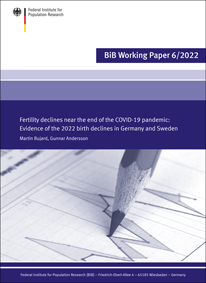Sonstige PublikationenFertility declines near the end of the COVID-19 pandemic: Evidence of the 2022 birth declines in Germany and Sweden
Bujard, Martin; Andersson, Gunnar (2022)
BiB Working Paper 6/2022. Wiesbaden: Bundesinstitut für Bevölkerungsforschung
Following the onset of the COVID-19 pandemic, several countries faced short-term fertility declines in 2020 and 2021, a development which did not materialize in Scandinavian and German-speaking countries. However, more recent birth statistics show a steep fertility decline in the aftermath of the pandemic in 2022. We aim to provide data on the unexpected birth decline in 2022 in Germany and Sweden and relate these data to pandemic-related contextual developments which could have influenced the post-pandemic fertility development. We rely on monthly birth statistics and present seasonally adjusted monthly Total Fertility Rates (TFR) for Germany and Sweden. We relate the nine-months lagged fertility rates to contextual developments regarding COVID-19 mortality and morbidity, unemployment rates, and COVID-19 vaccinations.
The seasonally adjusted monthly TFR of Germany dropped from 1.5-1.6 in 2021 to 1.3-1.4 in 2022, a decline of about 14 %. In Sweden, the corresponding TFR dropped from about 1.7 in 2021 to 1.5-1.6 in 2022, a decline of almost 10 %. There is no association of the fertility trends with changes in unemployment, infection rates, or COVID-19 deaths. However, there is a strong association between the onset of vaccination programmes and the fertility decline nine months after of this onset. The fertility decline in the first months of 2022 in Germany and Sweden is remarkable. Common explanations of fertility change during the pandemic do not apply in its aftermath. The association between the onset of mass vaccinations and subsequent fertility decline indicates that people adjusted their behaviour to get vaccinated before becoming pregnant, as societies were opening up with post-pandemic life conditions. Our study provides novel information on fertility declines in countries previously not affected by any COVID-19 baby bust. We provide a first appraisal of the COVID-19-fertility nexus in the immediate aftermath of the pandemic.

